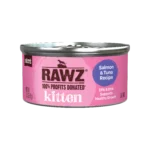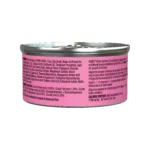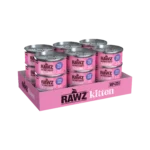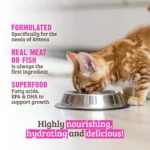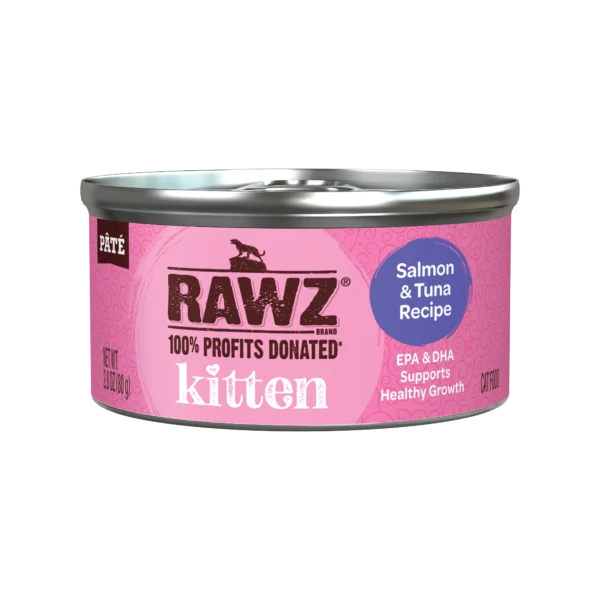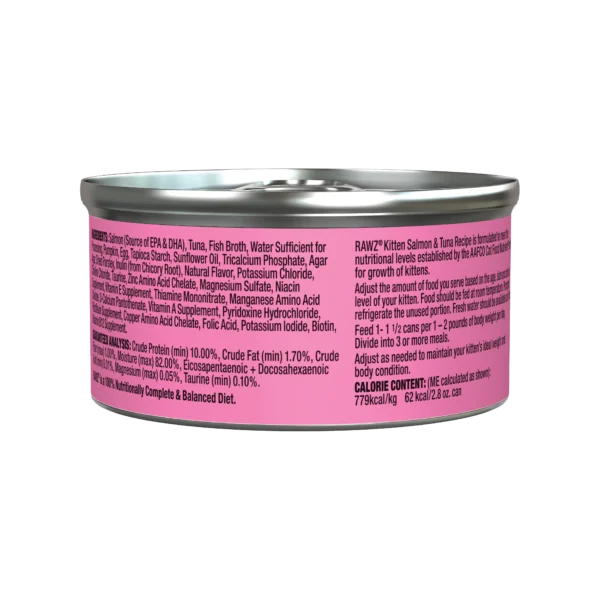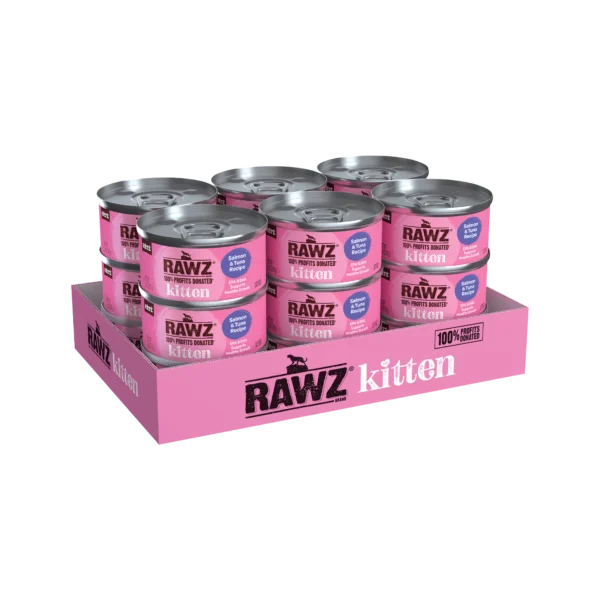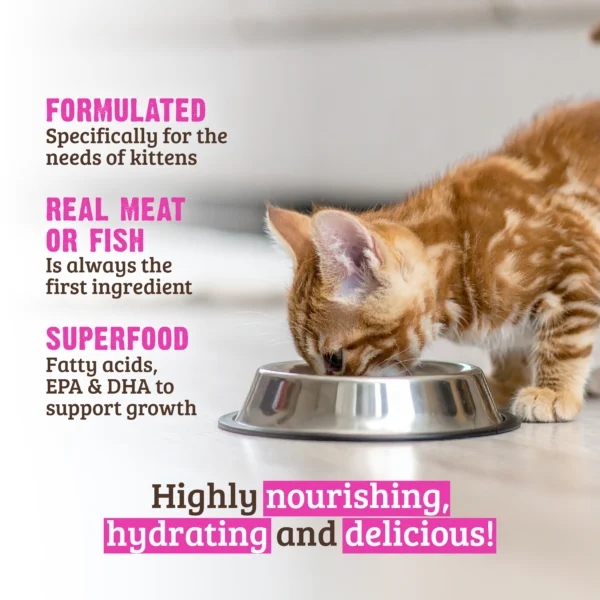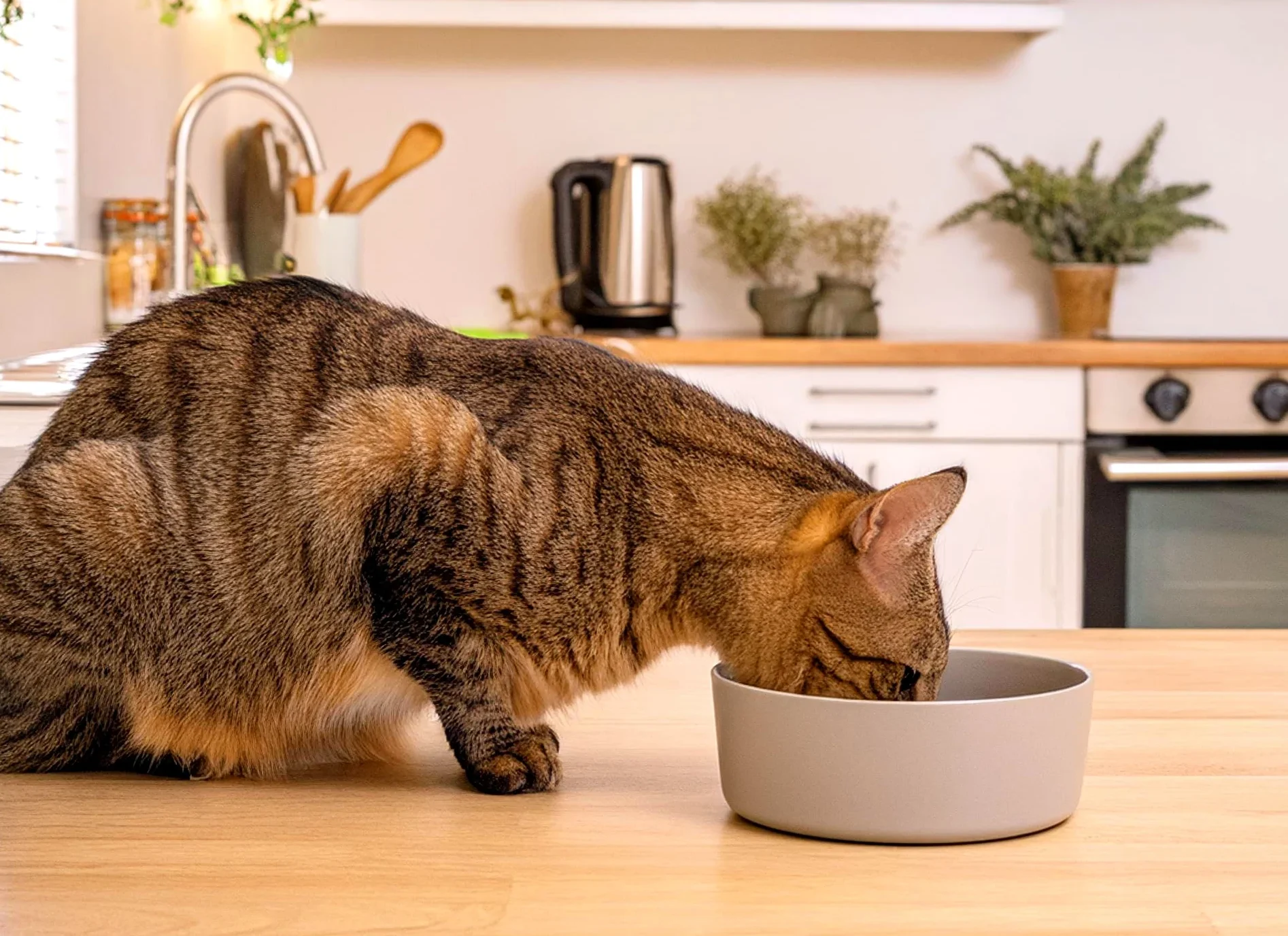FORMULATED SPECIFICALLY FOR KITTENS
- Protein-packed meat or fish is 1st ingredient
- EPA & DHA to support healthy growth
- High in moisture to provide vital hydration
INGREDIENTS:
Salmon (Source of EPA & DHA)Our salmon is an excellent source of protein, minerals, vitamins and omega-3 fatty acids. Proteins are the building blocks of organ tissues and cells. Amino acids contained in protein are responsible for many processes in the body, including maintenance of smooth workflow and digestion. Amino acids also help to regulate hormones, build muscles, fix tissue in tendons, ligaments, cartilages, and maintain healthy skin, coat, and nails., TunaTuna is a heart friendly, excellent source of protein. It has been shown to lower blood pressure, support a healthy immune system, as well as improve bone and skin health., Fish BrothA reduced-sodium broth essential for a high-moisture food., Water Sufficient for ProcessingX, PumpkinThe soluble fiber in pumpkin flesh slows digestion and can help manage sensitive digestive systems that are prone to upset stomachs. Pumpkin is also rich in potassium, Vitamin C and carotenoids, such as beta-carotene, EggGood source of highly digestible protein (~100% digestible); naturally rich source of selenium, vitamin D, B6, B12 and minerals such as zinc, iron and copper, Tapioca StarchA form of carbohydrates derived from the root of the cassava plant., Sunflower OilSunflower oil contains a high level of linoleic acid produced by expressing the oils of sunflower seeds. Sunflower oil is low in saturated fat, which makes it a better choice than oils and fats that are high in saturated fat. Sunflower oil is used to provide essential fatty acids. Essential fatty acids (EFAs) are fats that must be supplied in the diet because the body cannot produce them. They are required for normal growth and functioning of the cells, muscles, nerves, and organs and the production of prostaglandins. Deficiencies of EFAs are linked to a variety of health problems, including heart disease, cancer and diabetes., Tricalcium PhosphateA source of calcium combined with phosphorus. Calcium is essential in maintaining healthy bones and teeth. Phosphorus is an essential structural component of cell membranes and nucleic acids. It also plays a vital role in many biological processes, including energy production, cell signaling, and bone mineralization., Agar AgarAgar Agar is a naturally occurring compound found in red seaweed that is necessary for gravy to have a thick consistency and a mouthfeel that dogs and cats love., Dried ParsleyParsley is highly nutritious and a rich source of protein, fiber, and vitamins A, C, B1, B2, and K. It also contains trace minerals such as calcium, potassium, iron, magnesium, and phosphorus., Inulin (from Chicory Root)Inulin is a prebiotic fiber that supports the beneficial bacteria in your pet’s gut, maintaining a healthy microbiome and helping support digestion and overall health., Natural FlavorA flavor enhancer derived from natural sources in place of rendered fats., Potassium ChlorideA source of potassium important for acid-base balance and a healthy nervous system., Choline ChlorideA source of choline, a water-soluble nutrient, essential for proper nerve function including memory and muscle control., TaurineTaurine is an amino acid required by both dogs and cats. While normally thought of as essential just for cats, taurine deficiency has been observed in some dogs eating certain pet foods. It is important for vision and cardiac health., Zinc Amino Acid ChelateAn organic source of zinc. Zinc is an essential mineral that supports healthy skin and coat. It helps maintain a normal sense of taste and smell, aids in the maintenance of a healthy immune system and helps in the synthesis of DNA and RNA., Magnesium SulfateA bioavailable source of magnesium, a mineral which is essential for cardiovascular function, muscle movement, and bone strength., Niacin SupplementA source of vitamin B3 which is essential for health. Your pet's body uses niacin to help turn food into energy., Vitamin E SupplementA fat-soluble vitamin and a potent antioxidant that helps improve circulation and cardiac output., Thiamine MononitrateA source of vitamin B1. Thiamine is essential for the metabolism of carbohydrates and also plays an important role in helping maintain a healthy nervous system., Manganese Amino Acid ChelateAn organic source of manganese. Manganese is an essential mineral and is necessary for the proper formation and maintenance of connective tissue., D-Calcium PantothenateA source of vitamin B5. It acts as a coenzyme in the conversion of amino acids and is important for healthy skin., Vitamin A SupplementA fat-soluble vitamin that is essential for healthy skin, coat and eyes/vision., Pyridoxine HydrochlorideA source of vitamin B6. Pyridoxine is essential for the metabolism of proteins. It acts as a cofactor for the large number of enzymes involved in the synthesis of amino acids and metabolism., Riboflavin SupplementA source of vitamin B2. Riboflavin is important for the digestion of fats and carbohydrates, and also promotes healthy skin and coat., Copper Amino Acid ChelateAn organic source of copper. Copper promotes normal red blood cell formation, aids in the production of several enzymes involved in respiration, and promotes proper connective-tissue formation., Folic AcidA B vitamin also known as vitamin B9. Folic acid is a water-soluble vitamin that plays an important role in various cellular functions., Potassium IodidePotassium iodide is a source of iodine, which is crucial for thyroid health and hormone production., BiotinA source of vitamin B7; occasionally it may also be referred to as vitamin H. Biotin plays an important role in the metabolism of fats, carbohydrates and proteins. It is especially important as it promotes the normal health of skin and coat., Vitamin B12 SupplementA B vitamin also known as cyanocobalamin. Vitamin B12 is a coenzyme in nucleic acid, protein and lipid synthesis.
CRUDE PROTEIN MIN: 10.00% | CRUDE FAT MIN: 1.70%
CRUDE FIBER MAX: 1.00% | MOISTURE MAX: 82.00%
EICOSAPENTAENOIC ACID + DOCOSAHEXAENOIC ACID MIN: 0.01%
MAGNESIUM MAX: 0.05% | TAURINE MIN: 0.10%
779 kcal/kg, 62 kcal/2.8 oz can
RAWZ® Kitten Salmon & Tuna Recipe is formulated to meet the nutritional levels established by the AAFCO Cat Food Nutrient Profiles for growth of kittens.
Adjust the amount of food you serve based on the age, size and activity level of your cat. Food should be fed at room temperature.
Promptly refrigerate the unused portion. Fresh water should be available at all times.
Feed 1 – 1 ½ cans per 1 – 2 pounds of body weight per day. Divide into 3 or more meals. Adjust as needed to maintain your kitten’s ideal weight and body condition.
| Nutrient |
As Fed |
Dry Matter |
Per 100 kcal |
Per 2.8 oz. Can |
Per oz. |
| CRUDE PROTEIN % |
12.58 |
62.9 |
16.1 g |
9.99 g |
3.57 g |
| CRUDE FAT % |
3 |
15 |
3.8 g |
2.38 g |
0.85 g |
| CRUDE FIBER % |
0.08 |
0.4 |
0.1 g |
0.06 g |
0.02 g |
| CARBOHYDRATES % |
2.54 |
12.7 |
3.26 g |
2.02 g |
0.72 g |
| PHOSPHORUS % |
0.28 |
1.4 |
359 mg |
222.26 mg |
79.38 mg |
| MAGNESIUM % |
0.02 |
0.1 |
26 mg |
15.88 mg |
5.67 mg |
| ASH % |
1.8 |
9 |
2.31 g |
1.43 g |
0.51 g |
| SODIUM % |
0.12 |
0.6 |
154 mg |
95.25 mg |
34.02 mg |
| CALCIUM % |
0.3 |
1.5 |
385 mg |
238.14 mg |
85.05 mg |
| COPPER mg/kg |
3.35 |
16.75 |
0.43 mg |
0.27 mg |
0.09 mg |
| POTASSIUM % |
0.22 |
1.1 |
282 mg |
174.63 mg |
62.37 mg |
| IODINE mg/kg |
0.89 |
4.45 |
0.11 mg |
0.07 mg |
0.03 mg |
| TAURINE % |
0.1 |
0.5 |
128 mg |
79.38 mg |
28.35 mg |
Metabolized Energy (ME) Profile
| Calories from Protein |
56.1% |
| Calories from Fat |
32.5% |
| Calories from Carbohydrates |
11.3% |
Balanced Nutrition & Digestibility of Ingredients
Balanced nutrition, or the complete portfolio of the ingredients, not single data points of nutrients, are essential for your pet’s health. In addition to nutritional balance, the digestibility of ingredients and the bioavailability of protein and amino acid profiles are also crucial for your pet’s health.
Typical Analysis
Our typical analysis represents an average using values from ingredient databases and actual lab reports of our foods. This average is not intended to represent exact amounts. This additional nutritional information should be used as a general guide to help you and your veterinarian or nutritionist choose which recipe is best for your unique pet. Please contact RAWZ Customer Service with any questions you may have.
